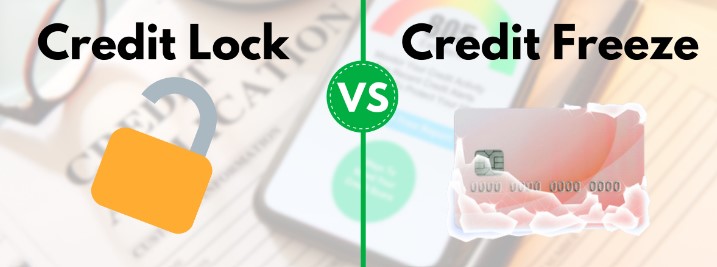What is a Credit Freeze vs. Credit Lock?

Credit freezes and credit locks both restrict access to your credit reports. But credit freezes are free, while credit locks may be offered as part of an expanded paid service by companies like Experian, TransUnion, Equifax or LifeLock. Credit locks and credit freezes are tools that help protect against criminals hijacking your credit history for purposes of identity theft and other forms of credit fraud. Applying either a credit freeze or a credit lock at one of the national credit bureaus (Experian, TransUnion or Equifax) restricts access to your credit file, limiting credit checks that are typically the first step in processing applications for loans or credit cards. A credit freeze or credit lock may be a wise idea if you’ve been victimized by an identity thief or if you know your personal data has been stolen, compromised through a data breach or otherwise exposed to potential abuse. When this isn’t the case, a fraud alert is often a better alternative.
*What Is a Credit Freeze? *
Federal law allows you to freeze and unfreeze your credit on your credit report from each credit bureau (Experian, TransUnion, Equifax) at no cost.
To limit all access to your credit history using credit freezes, you must request a separate freeze from each of the three national credit reporting agencies.
• Equifax: Online at https://www.equifax.com/personal/credit-report-services/credit-freeze/ or by phone at 800-685-1111
• Experian: Online at https://www.experian.com/freeze/center.html or by phone at 888-397-3742
• TransUnion: Online at https://www.transunion.com/credit-freeze or by phone at 888-909-8872
By law, credit bureaus must activate a credit freeze within 24 hours of receiving a request by phone or online, and they must lift a freeze within one hour of receiving a request to do so online. But you can turn your freeze on or off in near real time by toggling a security freeze on or off in your account. Credit freezes are effective at thwarting unauthorized access to your credit file, but they also limit authorized access to credit information. Because they limit a lender’s ability to check your credit, you’ll need to thaw your credit freezes before applying for a loan or credit account. Because they limit credit checks, credit freezes may interfere with your ability to get instant credit authorizations online or at retail checkouts, but they do not harm your credit or have any impact on your credit score.
What Is a Credit Lock?
Like a credit freeze, a credit lock limits all access to your credit report and you can activate it and disable it instantly via an app or secure website. Service offerings that include credit locks differ among the national credit bureaus. Each credit bureau requires you to provide proof of identity when you set up a credit lock. You can submit the necessary documents electronically or mail in hard copies. The security benefits of a credit lock are the same as those for a credit freeze, and the limitations on access to your credit are the same as well: Criminal access to your credit file is protected against, but any legitimate access by new lenders to whom you are applying for loans or credit may also be limited. You may also want to consider a third option: a fraud alert.
When to Use a Fraud Alert
A less severe alternative to credit freezes and credit locks is another free option called a fraud alert. A Fraud alert allow lenders to see your credit file, but it requires verification of your identity before any credit application is processed or any new account is opened in your name.
There are three types of fraud alerts available:
• Initial fraud alert: While all fraud alerts are free, only the most basic one, known as an initial or temporary alert, can be set up by anyone, anytime and for any reason. You may want to place a temporary fraud alert if you suspect your personal information has been compromised but haven’t yet confirmed it; if a credit card goes missing, for instance, or if you see unusual activity on a credit card or bank account but haven’t yet determined if it’s criminal. A temporary fraud alert lasts one year, but can be renewed indefinitely.
• Active-duty fraud alert: This type of fraud alert also lasts one year, and is designed for use by members of the U.S. armed forces on assignment away from home.
• Extended fraud alert: This alert lasts seven years and requires you to submit a copy of a fraud report you supplied to a law enforcement agency. All three types of fraud alerts are lifted automatically upon expiration, but you can remove one any time before that upon request, just as you can discontinue a credit freeze or credit lock.
In Summary
Credit freezes and credit locks are relatively extreme measures that lock down your credit files as securely as possible, limiting access by both criminal actors and lenders from whom you may be seeking credit. They offer excellent security for your credit data, but using them when you’re actively seeking new credit requires some careful planning.
​New Life Credit Restoration Solutions Educational Team
